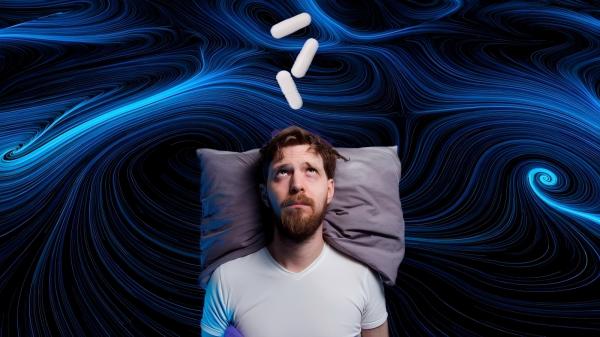
How Does Lack of Sleep Affect Your Heart Rate? 7 Surprising Impacts
Have you ever considered how those tossing and turning nights are impacting your heart? You're not alone. Our lives are hectically busy and finding time to sleep well is not always a priority, but the ramifications of this can be shocking – as well as dangerous. If you were not aware already, sleep deprivation can affect your heart rate to a great extent. That is true, and the consequences are not limited to a feeling of sluggishness the following day. On this enlightening journey, discover 7 unexpected ways lack of sleep influences your heart rate and general cardiovascular wellbeing. If so, you'll want to dig into the science behind these links — from disrupted circadian rhythms and hormone disruption. Are you ready to learn being the best catch call your Z's heart healthier for good? Embarking on this road to better sleep and a healthier heart!
Key Takeaways:
Sleep deprivation can raise blood pressure and may increase the risk for heart disease, heart attacks, and heart failure.
- A lack of sleep can also result in disturbances to the body's glucose metabolism, which increases the susceptibility for weight gain and other heart issues.
- It exacerbates sympathetic nervous system activity, raising your heart rate and global cardiovascular function.
Sleep Dyspnea–sleep apneas are an important risk factor for heart health, causing sleepiness and cardiovascular diseases.
It is an important method in maintaining a low heart rate and benefits to the cardiovascular risk reduction through improving sleep quality.
Early, period: 'If you are struggling with long-term sleep problems and heart health.
What is Sleep Deprivation and Heart Health?
In the busy world we live in, sleep deprivation is one of many growing issues. You get sleep deprivation when you regularly have less than 7 hours of rest (for adults). Chronic sleep deprivation is scary because of how many aspects it affects our health overall especially curring into your heart.
Sleep deprivation is widespread
Some studies indicate that 1 out of every three adults are not getting the appropriate amount of sleep with some consistency. Over time this lack of sleep can lead to a range of health problems, including cardiovascular disorders.
Heart Health and Lack of Sleep
Insufficient sleep results in higher stress on your body. This stress can:
- Elevate blood pressure
- Increase inflammation
- Affect hormone production
- Disrupt glucose metabolism
Over time, all of these things can have a major impact on the heart.
Sleep Quality — Why Does It Matter?
Quality matters every bit as much as quantity when it comes to sleep. However, disrupted or low-quality sleep is also damaging in its own right – you can still get enough hours but if you're not getting good quality of that rest during the night then your brain won't be able to process and lodge away all those precious memories.
Unfortunately, as it turns out this type of sleep deprivation can be disastrous for your heart health reminding us that both quantity and quality of our sleep is equally important.
Learn More About: From Bedtime to Wake-Up: How Smart Rings Capture Your Entire Sleep Journey
Relationships between Sleep and Heart Rate
Your heart rate varies during different stages of sleep and these two are associated. When you go to bed, your heart rate relaxes and slows — allowing your cardiovascular system time to rest.
The Sleep-Heart Connection
When you go to sleep, your body releases a hormone that relaxes the muscles. This slows your resting heart rate, which is typically 60-100 beats per minute when awake. By comparison, heart rate in the sleep stages of deep-sleep drops to 20-30% lower than during a waking.
Heart Rate Variability
HRV (heart rate variability) the variation in time between each heartbeat is also heavily impacted by sleep as well. Higher HRV during sleep is widely considered a marker of improved cardiovascular health and well-being.
Sleep Stages and Heart Rate
Specific sleep stages can impact heart rate differently:
Light Sleep: Your heart rate declines.
Deep Sleep: Your average heart rate will drop to one of its lowest levels, and your cardiovascular system has a chance for recovery.
REM Sleep — Heart rate: more variable, sometimes stolen; may increase to near-waking levels.
Thinking as such also helps us appreciate how important good sleep is for keeping a lower heart rate and bettering your overall cardiovascular health.
Key Takeaway: Sleep plays an important role in influencing heart rate, and sleep stages have a varied impact on your heart rate; hence high-quality sleep is crucial for maintaining good cardiovascular health.
How Smart Rings Differ from Other Sleep Trackers?
Generally, smart rings like the BKWAT Smart Ring do have some distinct advantages over traditional sleep trackers:

Comfort and Convenience
Compared to data-sensing equipment such as wristbands and smartwatches, smart rings build up their very own technology. They are easy to use because you can get them to work without interrupting any activity in your routine.
Precise Measurements
The device obtains data from the blood flow that goes through the arteries in a user's finger, which ensures measurement accuracy and is different from ones using wrist-based signal. This is why it can identify even the smallest difference in heart rate and temperature.

Extended Battery Life
It turns out that some smart rings are more efficient in terms of battery life than smartwatches, with some smart rings going up to a week with one charge. This involves less time spent charging and more regular sleep monitoring.
Focus on Sleep
The main focus of smart rings' is on sleep where the look is less into fitness tracking and more towards sleep monitoring. The broadness of the concentration is a reason behind more comprehensive data sets and insights.
The Way Your Heart Rate Changes as You Sleep
During various phases of sleep, your heart rate changes in different ways during the night. Your heart rate normally changes with each sleep cycle stage.
Light Sleep
The first sleep phase, light sleep shows the initial signs of a drop in heart rate. This is the time when you can get up or otherwise be wakened and experience short periods of wakefulness.
Deep Sleep
If you go on down into deep sleep — 'slow-wave' sleep, your heart rate will slow lower yet. It is essential for your body to repair and recover here.
REM Sleep
You will find your heart rate becomes less variable during Rapid Eye Movement (REM) sleep. It can speed up or it could go slow; typically reflecting the emotions in your dreams.
Your heart rate changes as you sleep, decreasing when you are in deep slumber and increasing variability during REM sleep.
The 7 Most Unbelievable Sleep Deprivation Symptoms That Affect Your Heart Rate.
Heart Rate: Sleep deprivation can work wonders on our resting heart rate, oftentimes in manners that we least expect. The absence of sleep can affect the cardiovascular system in many ways, some that may surprise you. 7 Surprising Ways Sleep Affects Your Heart
1. Elevated Blood Pressure
Blood pressure can rise due to insufficient sleep. Lack of sleep keeps your body on alert which can keep blood pressure from going down as it should. This continual elevation places added demands on your heart and blood vessels.
2. Risk for Heart Disease Rises
Regularly sleeping too little or constantly waking up exhausted is associated with an increased risk for coronary heart disease. Security involves the tricky job of digesting plaque inside your arteries after sleeping instead causing inflammation in other parts of you body that will eventually lead to coronary artery disease due to a type II wound healing response.
3. Increased risk of a heart attack
People who get fewer than six hours per night have a 20 percent increase in risk of heart attack compared to those sleeping between seven and eight hours per night, researchers found. This can cause stress hormones to be released which could increase the risk of cardiovascular events.
4. Disrupted Glucose Metabolism
Length Senile state can impair your body's ability to regulate blood sugar levels. This perturbation in glucose metabolism is associated with weight gain and a greater risk of type 2 diabetes, closely related to heart health.
5. Increased activity of the sympathetic nervous system
Not getting enough sleep can make your sympathetic nervous system work too hard and increase a heart rate as well as blood pressure. The increased sympathetic tone can eventually lead to more strain on your cardiovascular system for example.
6. Higher Risk of Heart Failure
Heart Failure — Chronic sleep deprivation may increase the risk of heart failure as per this study. Structural changes in heart (including atrial fibrillation): Changes not simply because of hours spent; lots of points scored for both quality and quantity.
7. Abnormal Secretion of Melatonin
Lack of sleep may affect melatonin production, a hormone necessary to regulate your body's internal clock. Such dysregulation can result in sleep disturbances and consequently worse cardiac outcomes.
💡 Take Home: Sleep deprivation has significant effects on heart and cardiovascular function through multiple pathways underlining the need to place a high value of quality sleep for your heart.
How Does Lack of Sleep Affect Your Health?
1. Impact on Nocturnal Dipping
When we do not get enough sleep, this nocturnal dipping is usually lost. Without this nightly dip, your cardiovascular system is under pressure all the time.
Hormonal Imbalance
Sleep origami: Less sleep changes hormone production, particularly stress hormones like cortisol. This hormonal imbalance can elevate their blood pressure levels all over the day.
🌟 Take-Home Message: Chronic partial sleep deprivation contributes to non-dipping and hormonal imbalance, which leads to BP nocturnal valuing increasing the probability of developing hypertension.
2. Higher Risk of Cardiovascular Disease
Long-term sleep deprivation elevates your likelihood of heart disease. Research shows that individuals who habitually sleep fewer than 7 hours every night have a higher chance of coronary artery disease in comparison to those who do not.
How Sleep Deprivation Effects Your Heart
According to the NCDHHS, lack of sleep can cause inflammation in your body and that can harm the inner lining of blood vessels. This can make it easier for plaque to develop in your arteries, which ultimately causes atherosclerosis.
Link to coronary heart disease
People who sleep 6 hours or less per night are more likely to suffer the consequences of coronary heart disease by 20 percent, according to a study. It becomes even greater when the no. of hours a person lacks sleep increases.
Quick Synopsis: Lack of sleep leads to a higher risk for heart disease, because chronic poor sleep triggers inflammation and arterial stress.
3. Increased Risk Of Heart Attack
For example, sleep deprivation dramatically raises the odds of heart attacks. When you do not get enough sleep on a regular basis, your body suffers more stress which increases inflammation and causes damage to the blood vessels.
Increased Inflammation
Sleep deprivation can cause an immune inflammation in the body. This inflammation can harm the inside of your arteries, making them more likely to develop plaque and heart attacks.
Elevated Stress Hormones
Not getting enough sleep triggers the release of stress hormones, such as cortisol. These hormones can increase your blood pressure and heart rate, which forces strain on the cardiovascular system that might result in a coronary sooner or later.
Impaired Blood Clotting
Lack of sleep may affect blood clotting factors in the body. This unevenness can result in the development of life-threatening coagulantes which may stop up veins private heart attack.
Why that matters: a sleeping debt has to be repaid at some point, with major implications for heart attack risk (that is, sleep deprivation can easily cause outright inflammation as well as fat-storing stress hormones or impairing blood clotting mechanisms).
4. Disrupted Glucose Metabolism
Inadequate rest negatively impacts your body's ability to efficiently use glucose. Lack of sleep can make your cells less sensitive to insulin, the hormone that lowers blood sugar. This can result in Insulin resistance:
Elevated Blood Sugar Levels
When you deprive your body of sleep, it ups the production of a stress hormone called cortisol—which skyrockets blood sugar. If you are not getting enough rest, your body has a hard time keeping it's glucose levels in check all day long.
Greater Susceptibility To Type 2 Diabetes
Not getting enough sleep could increase your risk of type 2 diabetes. Research indicates that those who consistently sleep fewer than six hours each night are at a greater risk of becoming obese ]);
Weight Gain and Obesity
When glucose metabolism is disrupted you are likely to feel very hungry and develop cravings for high-calorie foods. When coupled with the decline in energy expenditure induced by fatigue, this can increase over time to cause weight gain and subsequent obesity.
⭐ Key Takeaways: Lack of sleep, according to several studies, corresponds with disturbed glucose metabolism (making you more susceptible to diabetes) and weight gain.
5. Excessive Activity of the Sympathetic Nervous System
Your sympathetic nervous system (also known as the part of your body that regulates "fight or flight") can go haywire when you're short on sleep. This sends your body into an overdrive of this system even if you are sleep deprived:
Increased Heart Rate
You will hear or sense your heart rate speeding up at those moments when you are resting since lack of sleep causes it. The pressure to be on all the time can place your cardiovascular system under unnecessary strain.
Elevated Blood Pressure
This causes your blood vessels to constrict, increasing your blood pressure because a hyperactive sympathetic nervous system. The surge in cortisol may last well beyond morning bicycling and result in hypertension down the road.
Higher Stress Hormone Levels
Lack of enough sleep makes your body to release stress hormones like cortisol and adrenaline it more. Your body remains in high alert, sending out these hormones over and over which just adds more stress on the heart.
Lower Heart Rate Variability
These are pivotal measures to understand cardiovascular health that would diminish if someone were significantly sleep deprived over a longer period of time. Higher variability = lower risk of heart disease
💡 Hot Tip: Insufficient sleep enhances your sympathetic nervous system, which in turn increases heart rate and blood pressure among other cardiovascular risks.
6. It may also Increase Your Risk of Congestive Heart Failure
Long-term sleep deprivation can increase your chances of developing heart failure. This is a severe condition in which your heart cannot adequately pump blood to avoid the bodies needs.
How Sleep Breathing Disorders Lead to Heart Failure
Your heart muscle grows weaker with time, due to the deprivation of sleep. It also leads to:
- Increased inflammation
- Higher blood pressure
- Irregular heartbeats
All of this together stresses your heart, forces it to work harder and potentially causing some type ofheart failure.
Link with Atrial Fibrillation
Lack of sleep is also linked to an increased risk for atrial fibrillation, which can eventually cause heart failure. This condition:
* When the heart does not pump effectively *
Raises the possibility of developing a blood clot
– Untreatead it may result in a stroke
🔑 Key Takeaway: Long-term sleep deprivation leads to increased risk of heart failure through weakening the structure and function of heart muscles also helps for atrial fibrillation.
7. Melatonin Secretion Dysregulation
One key piece is melatonin, known as the “sleep hormone,” which helps keep our sleep-wake schedule in check. It can have unexpected impacts over the heart rate by disturbed production with sleep deprivation.
Impact on Circadian Rhythm
Insufficient sleep can disrupt the body's internal clock, causing melatonin to be released at abnormal tacit times. That dysregulation can lead to changes in heart rate, since melatonin influences cardiovascular function.
Cardiovascular Consequences
The results add to growing evidence that disrupted melatonin production can lead the heart muscle — and maybe other parts of your body, too — not getting proper signals through these 24-hourly-controlled-restoration periods when you are at rest. This may lead to a rise in the resting heart rate, which can put stress on the cardiovascular system if this happens for prolonged periods.
Takeaway: Sleep deprivation can mess with our melatonin production which in turn interrupts the natural rhythm of the body again resulting to other (more complicated) stress-related reactions including erratic heart rates and even more cardiovascular challenge.
Mechanism explaining link between poor sleep and heart health
One of the most notable downfalls to sleep deprivation is concerning cardiovascular health problems. New research has teased out the complex ways in which we depend on sleep to lower our risk for heart disease.
Hormonal Imbalances
Inadequate sleep disrupts oddly the hormones of our body. As cortisol, aka "the stress hormone," rises when you don't sleep. This elevation can lead to:
- Higher blood pressure
- Increased heart rate
Increased risk of cardiovascular diseases
Oxidative Stress and Inflammation
Lack of sleep has also been shown to lead to low-grade inflammation all across your body. This chronic, inflammatory state can:
- Damage blood vessel walls
– Encourage arterial plaque formation.
– Raise the risk of having heart attacks and strokes
Metabolic Dysregulation
And to the metabolism, with glucose regulation affected by lack of sleep. This can result in:
- Insulin resistance
- Increased risk of type 2 diabetes
- Greater risk of being obese, one of the main causes for heart disease
Imbalance of The Autonomic Nervous System
In return an overactive sympathetic nervous system can be evoked, thus leading to:-
- Elevated heart rate
- Increased blood pressure
- Higher risk of arrhythmias
A case-control study published by the National Library of Medicine revealed that people who slept less than 7 hours per night were up to 48% more likely to develop cardiovascular disease compared with those with normal sleep patterns.
Lesson: Not getting enough sleep leads to an array of hormonal imbalances, inflammation, metabolic dysregulation and disruption in the autonomic nervous system — all negatively affecting your heart.
The Role of Circadian Rhythms
In fact, circadian rhythms are fundamental for the regulation of not only our sleep-wake cycle but also other processes in our bodies like heart health. Your internal biological clocks are regulated by a group of nerve cells located in the brain, particularly the suprachiasmatic nucleus (SCN), which can impose their rhythm on many other physiological processes through daily cycles.
Heart Rate Regulation By SCN Neurons
These neurons, found in the suprachiasmatic nuclei (SCN), are what keep our body working on a 24 hr cycle that synchronizes with light and dark. While the body is awake, these same neurons send commands to pick up its heart rate and blood pressure in order to get through the day. Rather, during sleep they stimulate reductions in heart rate and blood pressure that permit the cardiovascular system to rest and recuperate.
Circadian Rhythm Disturbance
If our circadian rhythms are altered — say, by jet lag or shift workanyahu — it can wreck us.
Abnormal heart rate tracings
- Higher risk factors for cardiovascular problems
Hormonal Imbalances Impacting the Heart
💡 Key Takeaway: Disruption of the circadian cycle by SCN neurons may affect heart rate and BP changes throughout the day, which in turn could predispose to CV abnormalities.
Heart Health Concerns with Sleep Apnea
Sleep apnea is a serious sleep disorder that could really affect you heart! Left untreated, this condition of recurrent pauses in breathing during sleep can cause a variety of cardiovascular problems.
Understanding Sleep Apnea
Sleep apnea is a condition where the oxygen flow is interrupted when you are asleep and your airways become obstructed or collapse. These breaks may last some seconds to minutes and can occur 30 times or even more per hour. Your body then endures periods of oxygen levels during your readings, stressing the heart.
Relationship Of Exercise And Sleep Disabilities According To The Conclusions from These Studies How Serious Is Sleeping Disorders In Controlling Our Lives? Heat Exhaustion / Stroke: What's the difference)NSStringTies Untangling Sleep Apnea and Heart Health
We now know that there are more direct detrimental effects of sleep apnea on the heart including:
1. High blood pressure
2. Beating of heart ineffectively (arrhythmia)
3. Heightened risk of heart attack and stroke
4. Heart failure
What are the signs of sleep apnea?
- Loud snoring
Choking or gasping sounds during sleep
– Daytime sleepiness
- Morning headaches
- Difficulty concentrating
If you are experiencing these, its important to see a sleep and facial pain expert or board-certified otolaryngologist for proper diagnosis and treatment.
Treatment Options
All in all, curing sleep apnea can help improve your heart. 8) What does it do for my Heart? Options include:
1. CPAP: Continuous Positive Airway Pressure
2. Oral appliances
3. Behavioral modifications (weight reduction, avoiding alcohol before bed)
4. Surgery in severe cases
Conclusion: Sleep apnea is an important systemic disease which may modulate insulin resistance, increase sympathetic tone and produce deleterious cardiovascular effects.
Cardiac Impact of Sleep Deprivation Over the Long-Term
Long-term sleep deprivation can do serious damage to your cardiovascular health. In the long run, get by on a few hours less sleep and you set off an avalanche of health problems — including those related to your heart.
Can height increase the risk of Hypertension?
Chronic sleep deprivation can give rise to consistent inadequacy in blood pressure. Chronic hypertension — or long-term high blood pressure — is much harder on your heart because it makes the muscle pump extra hard to move blood all over your body. As the heart continues to work harder over time, it can enlarge and stretch out as well as weaken.
Accelerated Atherosclerosis
Sleep deprivation over time can speed up atherosclerosis, or the stiffening of your arteries. It then starts to narrow your arteries, starving your heart and other organs of the blood they need — causing a higher risk for heart attacks or strokes.
Hormonal Imbalances
Consistent lack of sleep can interfere with the hormones in your body that regulate hunger, stress and metabolism. Having an imbalance in the gut flora can cause you to gain weight, develop insulin resistance and see more inflammation (all are risk factors for cardiovascular disease).
Improving the quality of is crucial for keeping your heart healthy. When you incorporate solid sleep habits, you can considerably lower your risk for cardiovascular problems as well and take a major step towards becoming truly healthier.
Build A Sleep-Inducing Setting
Keep your bedroom a sleep-only space:
- Make the room dark quiet cool
* Buy a good mattress and pillows
Establish a Calming Bedtime Routine
Do something to relax your mind before bed so that you let go of the baggage from the day (crossword, bubble bath, movie)
Consider doing relaxing activities such as reading or light stretching
Sub out meditation or stop and take deep breathes
Don't screens before sleeptime ( because of the blue light)
Watch Your Diet and Exercise
How Your Daily Routine Affects the Quality of Sleep You Get
Limit caffeine and alcohol, especially in the evening
Steer clean of large dinners late evening
1.- Get regular exercise, but not too close to bedtime
If necessary get professional help
If you are still having trouble, see a sleep expert or healthcare professional. These can uncover root causes and thus tailored treatments for both duration & quality of sleep.
Adopting these strategies may lead to better quality sleep which benefits your heart like a two-way street. Never forget: good sleep is a basic element for the wellbeing of brain and body alike,
Takeaway: Sleep quality, impact heart health by maintaining consistency and a sleep conducive environment.
Tips for Better Sleep Hygiene
Getting regular sleep is important for heart health. 6 Strategies to Support Better Sleep Hygiene
Keep your Sleep Schedule Normal
2- Keep a good sleep routine, even on weekends.
- Helps to re-synchronise your internal body clock
Establish a wind-down routine for bedtime
Do: - Read or stretch a bit
Stay off phone, computer screens at least an hour prior to sleeping due to blue light
Optimized Sleep Environment
✏️ Establish a dark, quiet and cool bedroom environment
Get Necessary Quality of Mattress and Pillows
Maintain a Healthy Diet and Stay Active
3-Stay away from caffeine, alcohol or large meals right before bed
Get regular exercise, but not right before bed
Manage Stress
Relaxation exercises such as deep breathing or meditation
4— Deal with your fears before going to bed
With a reduced duration of poor sleep quality, choose dietary options & improve your well-being and heart health.
QUOTE: Improving your sleep hygiene can lead to better quality of, not just sleep but also heart health.
WHY IDENTIFY SLEEP DEPRIVATION SYMPTOMS
Knowing the signs of a lack of sleep can help you stay heart healthy. When you are able to recognize these signs early, then can make some proactive actions in order to enhance your sleep routine; this would also save you against harmful effects of cardiovascular system.
Conclusion
As we've explored, the impact of sleep deprivation on heart rate and overall cardiovascular health is profound and far-reaching. From elevated blood pressure to increased risk of heart disease, the consequences of neglecting our sleep are serious. But there's good news: by prioritizing quality sleep, we can significantly improve our heart health and overall well-being. Take action today to protect your heart. Establish a consistent sleep schedule, create a relaxing bedtime routine, and aim for 7-9 hours of sleep each night. If you're experiencing persistent sleep issues or concerns about your heart health, don't hesitate to consult a sleep expert or healthcare professional. Remember, every step towards better sleep is a step towards a healthier heart. Your future self will thank you for the investment you make in your sleep habits today. Sweet dreams and here's to a healthier, happier you!





![Blood Pressure Chart Guide: Understanding Your Readings for Better Health [2025]](http://bkwat.com/cdn/shop/articles/Blood_Pressure_Chart_Guide.jpg?v=1734339250&width=612)

